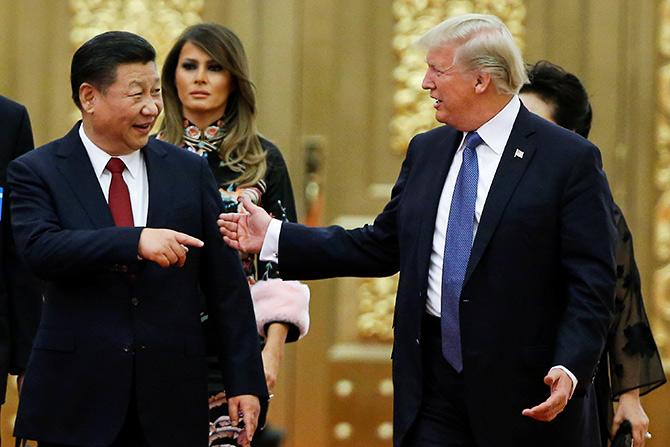 | « Back to article | Print this article |
'We have here the world's largest economy and dominant superpower thrashing about as it wrestles with its own decline.'
'It has become everything that China was supposed to be: A threat to the world order, and as a country that is not playing by the rules on trade, on climate change, international commitments and nuclear deals,' says T N Ninan.

IMAGE: US President Donald J Trump and China's President Xi Jinping at a state dinner at the Great Hall of the People in Beijing, November 9, 2017. Photograph: Thomas Peter/Reuters
Zillions of articles and hundreds of books have been written, focusing on the problem of managing the rise of China.
The more urgent problem, it would seem, is managing the decline of the United States.
China has been presented and analysed (also damned) as a threat to the world order, as a country that has not been playing by the rules either domestically or internationally, and as a country that should 'normalise' but may not do so.
Hence the problem, often viewed through a particular prism of history: The failure to manage the rise of Germany a century ago, and its consequences.
It is time to flip the viewing glass and consider the whole thing from a different perspective.
We have here the world's largest economy and dominant superpower thrashing about as it wrestles with its own decline -- which is still only relative, and by no means absolute.
Confronted with even that limited challenge, it has become everything that China was supposed to be: A threat to the world order, and as a country that is not playing by the rules on trade, on climate change, international commitments and nuclear deals.
The 'exceptional country' displays a worrying level of unpredictability in its conduct, including in its electoral behaviour.
At its centre, consequently, is a man not prepared for high office, behaving like the Red Queen as he shouts 'off with his head' at all and sundry.
When he can't, he rails at the restraints that the system imposes on him.
No one knows what he will do next, on North Korea or Mexico.
So, sure, speculate on what Xi Jinping's search for all-encompassing power means for China, but what about the erstwhile rule-maker becoming the rule-breaker?
Managing decline is more difficult than managing success.
Companies have to downsize, get rid of employees and trim costs or go bankrupt.
Rarely does this process produce happy outcomes, or corporate heroes.
But what of entire economies? Domestically, the burden of loss (of manufacturing, in the US case) is always borne unfairly, creating social and political pressures that break the mould and pose fresh questions.
If good answers are found, the system acquires a new balance. What if not? We get Mr Trump.
Economically, the urge to protect primacy has led to the revival of bad old ideas. Internationally, there is a progressive loss of control -- as Rome saw.
Then as now, decline encourages challengers, like Russia today.
Mistakes have paved the way to this point. China was misread as a country that would normalise (that is, become democratic) as it grew prosperous and acquired a middle class -- and on that basis given trade concessions that have come back to bite the US.
Beijing played a clever hand, promising a 'peaceful' rise, but has started behaving like any other hegemon -- a very different kind of normalisation from the one hoped for.
Iran was misconstrued as a country that put cause before country, and therefore mishandled.
Iraq was a comprehensive botch-up, and Russia might have been more cooperative if the West had honoured its agreements a quarter century ago, or given it a little space around its periphery.
As with companies experiencing hubris, so with countries: The unipolar moment was too heady for diplomatic restraint.
It is not just the US that confronts decline. So do some of its key allies, like Saudi Arabia which has lost control of the oil market and faces also the regional risk of a rising Iran.
It responded first with a stab at regaining control of the oil market through over-production, but that proved self-defeating.
Now, as technological developments threaten the decline of oil, and therefore an end to easy Saudi prosperity, it attempts long-ignored domestic reform, but in the personalised way that countries without the required institutional strengths try to manage change.
As Gorbachev discovered when he tried to manage Soviet decline without fully comprehending what his proposed changes would mean, success is not guaranteed.